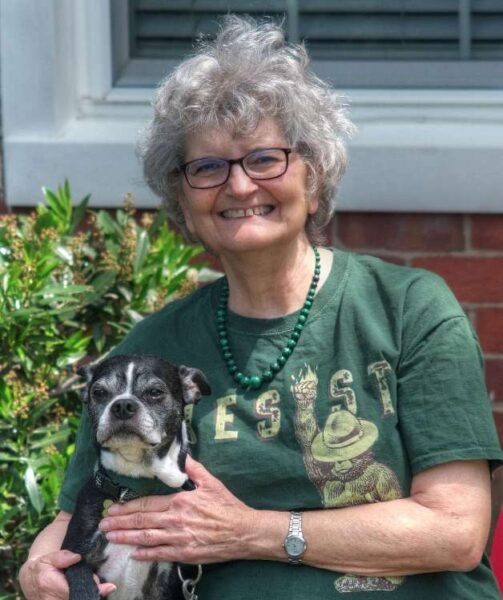This sponsored column is by Law Office of James Montana PLLC. All questions about it should be directed to James Montana, Esq., Doran Shemin, Esq., and Laura Lorenzo, Esq., practicing attorneys at The Law Office of James Montana PLLC, an immigration-focused law firm located in Falls Church, Virginia. The legal information given here is general in nature. If you want legal advice, contact us for an appointment.
[A note: There is plenty of immigration news this week, but we’ll get to it next time. Today, we want to remember a friend of our immigration practice, and a friend of all dogs, Jane Leclerc. We hope that you enjoy our eulogy for Jane.]
Jane Leclerc — her last name rhymed with care — died on March 17, 2023, in Arlington, at 7:37 in the evening. Her death was not felt by the public. Her passing was marked, some weeks later, by a gathering of friends.
Such people are not memorialized adequately. The secondary purpose of this eulogy is, in a small way, to remedy that; the primary purpose, of course, is to remember Jane.
Jane was born on January 7, 1949 in New London, Connecticut. After graduating from St. Bernard High School in nearby Montville, and then from Southern Connecticut State University, she came to Washington to volunteer at the Carter White House, where she worked in the Correspondence Unit. (One imagines an unending flood of typewritten letters complaining about gas prices — nothing has changed, in the intervening forty-five years, except of course for the typewriters.)
At some point — and here, the dates are entirely unclear — she married, then quickly separated from her husband; the writer never asked for any details, and she never imparted any.
After leaving the Carter White House, she took up a position in the correspondence section of the U.S. Department of Agriculture’s Food Safety and Inspection Service. (One imagines an unending flood of typewritten letters complaining about bad hamburgers and queasy-making lettuce; nothing has changed, vide supra.) She worked there for twenty years. Of her triumphs and tragedies within those walls, the writer again knows little, other than that her former coworkers describe her as patient and indefatigable.
Jane had less ambition to crush and conquer than most people who move to Washington, so she retired from the federal service at 55, when she was still young. She devoted the remainder of her life to the service of people and vulnerable animals. She helped one gentleman, unschooled in the ways of bureaucracy, to obtain his SSI benefits; she helped an entire family of Congolese refugees to wend their way through the immigration system and settle in the United States; she paid the tuition bills for a young Macedonian chemist and then helped her — the chemist, that is — to move to Germany, where she could exercise her profession. These acts of kindness led the chemist to name her daughter Jana, in honor of what Jane Leclerc had done.
Those are the acts of supererogatory charity known to the writer; surely, in the nature of things, there were many others.
Jane also had a frankly shocking love of animals. She had an interest, then a hobby, then a mania for elderly Italian Greyhounds. She adopted them late in life, sometimes two at a time, and nursed them until they died. The writer once visited her at home; he asked her, uncomprehendingly, “Why are there three dogs on the floor, and why do they have no teeth?” A partially satisfactory explanation followed.
Italian Greyhounds of a certain age meet with the same indignities that we do, if we are lucky enough to get there — incontinence, cataracts, and inconvenient digestions. She walked them constantly, paid for their eye surgeries, and fed them raw chicken.
The writer is reliably informed, though he did not personally see it, that Jane kept a pet bird; after the creature died, she preserved her feathered friend in her freezer. Love does not acknowledge your bourgeois objections.
Jane’s decline and death were swift, painful, and unfair. When she complained of a pain in her stomach, the doctors told her, surely accurately, that she had cirrhosis of the liver. She replied that they were wrong, because she never drank. The premise of her erroneous reply was true: the writer once offered her a bottle of limoncello at Christmas, which she refused, on the grounds that neither she nor the greyhounds needed it.
As so frequently, her doctors were potent to diagnose but powerless to cure. The usual series of half-therapeutic, half-painful, insufficiently palliative measures followed. In her last weeks of life, many of her friends visited her. The writer did not, presuming that no one wants to see a lawyer in the hour of death. That may or may not have been a mistake. Jane, who had a near-pathological aversion to sticking her oar in, would have recognized a kindred spirit’s reluctance to interfere.
Her life was characterized by the gentle wish, frequently fulfilled, to ameliorate suffering. She did not “leave her mark” on the world, as that brutal phrase suggests one should; she passed quietly from society, leaving it much as it was. But her virtues were real, her life was a good one, and she deserves to be venerated. Requiescat in pace.



